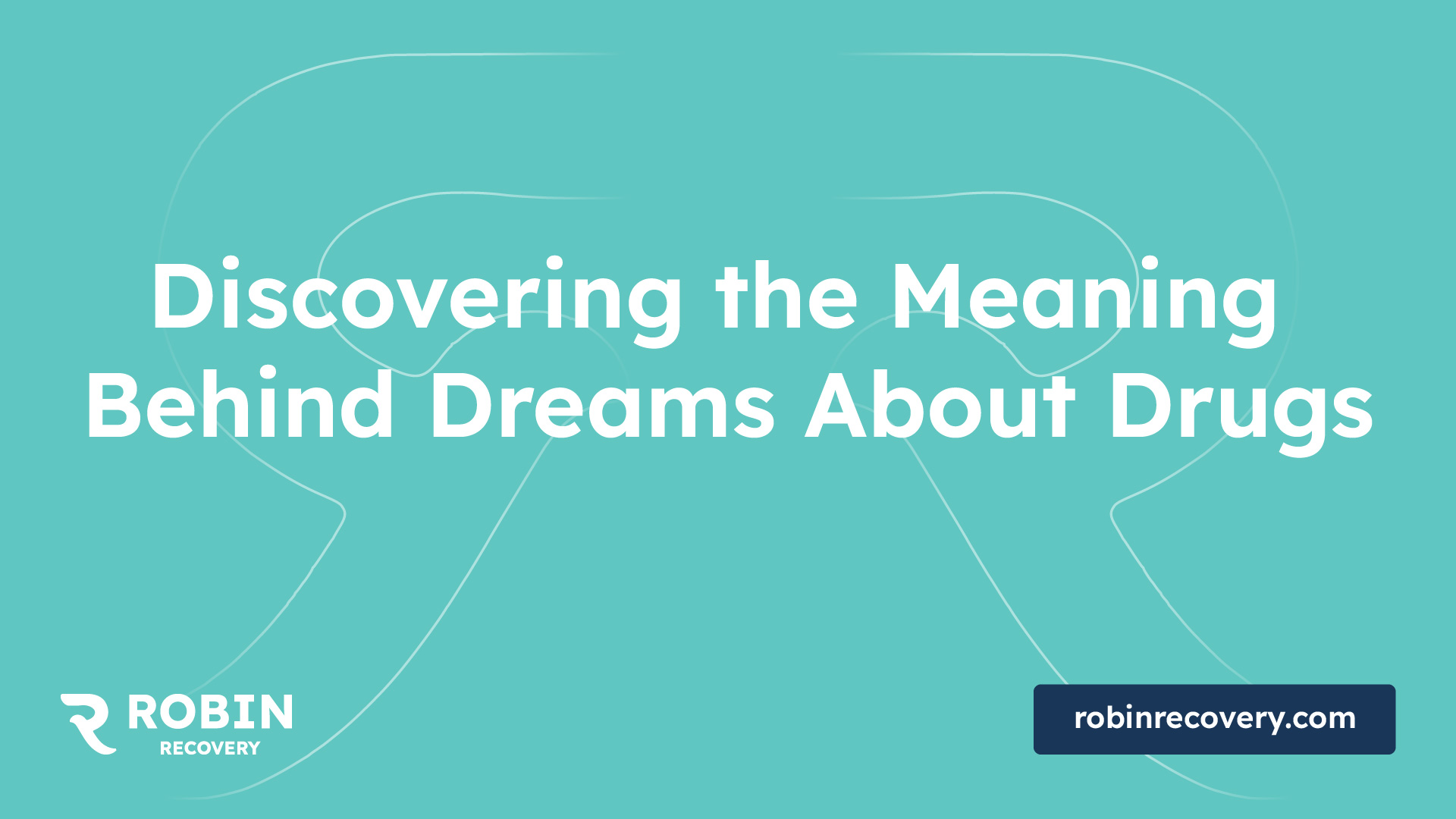Discovering the Meaning Behind Dreams About Drugs

Understanding Drug Dreams
Dreams about drugs serve as a window into an individual's psyche, reflecting personal experiences, internal conflicts, and emotional states. Understanding the symbolism and impact of these dreams can offer insights for those seeking clarity on their meanings.

Symbolism in Drug Dreams
Drug dreams can vary significantly in meaning based on personal experiences and emotional contexts. For individuals with a history of drug use, these dreams might encapsulate feelings of temptation, desire, or struggle. They may depict vivid scenarios where the dreamer feels the urge to use drugs or is actively searching for them, showcasing their internal conflicts with sobriety [1].
Individuals who have not used drugs may still experience dreams involving drugs, which can symbolize curiosity or fascination with substances due to their exposure to drug-related content. The meanings of these dreams are deeply personal and can reflect unresolved issues, internal cravings, or emotional stress, depending on each person’s life context [2].
Dream TypeSymbolic MeaningVivid usage scenariosStruggles with addiction, temptation, or relapseSearching for drugsPursuit of escape, unresolved issues, or desiresDreaming of refusing drugsCommitment to recovery, progress, and personal growth
Impact of Drug Dreams
The impact of drug dreams can be profound on an individual's emotional and psychological well-being. For those in recovery, these dreams can serve as reminders of struggles and temptations, often eliciting strong emotional responses. Early sobriety is marked by dreams that may heighten anxiety or insecurity regarding the ability to maintain sobriety [1].
As recovery progresses, dreams may shift towards more positive imagery, with the dreamer actively resisting drug use. This transition typically occurs around six months into sobriety, indicating a strengthening commitment to overcoming addiction.
These dreams can also unveil deeper psychological issues, often reflecting feelings of guilt, stress, or anxiety that require attention. By analyzing these dreams, individuals may discover areas of their lives that need addressing, offering a pathway to emotional healing and resolution [2].
Understanding the context and feelings associated with these dreams allows individuals to navigate their emotional landscapes more effectively, lending insights into their recovery journey and personal growth. For more information, consider exploring topics related to the impact of addiction, such as how to set boundaries with a spouse battling alcoholism or what are some examples of powerlessness?.
Evolution of Drug Dreams
Dreams about drugs evolve over time, reflecting the changes in an individual's recovery journey. This section explores the progression from early sobriety dreams, to drug-refusing dreams, and ultimately to a shift in substance focus.
Early Sobriety Dreams
In the initial stages of sobriety, individuals often experience vivid dreams centered around drug use. These dreams may involve scenarios where the dreamer actively seeks out or consumes drugs. Such dreams represent the internal conflicts and struggles faced by those in recovery as they work to break free from previous habits. Approximately one-third of adults in recovery report having these drug-related dreams shortly after stopping drug use [3].
These dreaming experiences typically occur during the rapid eye movement (REM) sleep stage, which can lead to heightened physical responses like increased heart rate or sweating. As individuals transition to sobriety, these dreams serve as a reminder of their past struggles and desires.
Transition to Refusing Dreams
After approximately six months of sobriety, many individuals begin to have drug-refusing dreams. In these dreams, the dreamer consciously resists the temptation to use drugs, demonstrating progress in their recovery journey. This shift indicates a strengthening commitment to sobriety and the ability to confront previous cravings in a controlled setting.
The transition from drug-using to drug-refusing dreams is an essential milestone in recovery, showing that the individual is making strides towards a healthier lifestyle. The dreams become a means to reinforce their resolve and demonstrate personal growth, which is crucial for long-term recovery.
Changing Substance Focus
As individuals continue on their recovery journey, the focus of their drug dreams may shift to different substances. For instance, they might start dreaming about smoking marijuana or drinking alcohol, reflecting the dynamic nature of their relationship with various substances throughout their recovery process. This shifting focus showcases the complexities of addiction and recovery; it illustrates how one's desires and challenges can evolve over time.
Over time, the frequency of these dreams tends to decrease, indicating progress in sobriety. Understanding these dream patterns can provide valuable insights into an individual’s psychological state and their ongoing battle against addiction.
For those interested in delving deeper into the meanings behind drug-related dreams, resources are available to help interpret these experiences and guide individuals through their recovery journey.
Psychological Perspective
Understanding the psychological implications of drug dreams can provide insight into the dreamer's subconscious state. These dreams often reveal deeper emotions and highlight unresolved issues related to addiction or past substance use.
Unconscious Cravings and Desires
Drug dreams can be seen as expressions of unconscious cravings and desires. They may signify a longing for pleasure, excitement, or stimulation. These dreams serve as manifestations of suppressed desires or unexpressed passions. During early sobriety, individuals might experience dreams that reflect their struggles with commitment to recovery. The sensation of drugs entering the body or searching for drugs in dreams can indicate unresolved issues that may hinder their recovery journey [1].
The context of these dreams, including the type of drugs and the circumstances surrounding their use, can carry significant meaning. For example, dreaming about marijuana may represent a desire for relaxation or relief from stress. In contrast, dreams about more stimulating substances might reflect a craving for excitement or new experiences [3].
Drug TypePossible InterpretationMarijuanaDesire for relaxation or stress reliefStimulantsCraving for excitement or stimulationDepressantsNeed for emotional escape or self-medication
Exploration of Inner Emotions
In addition to cravings, drug-related dreams often explore a myriad of inner emotions. They can represent feelings of escapism, where the dreamer seeks to self-medicate to cope with stress or emotional pain. The desire to escape reality can lead to subconscious explorations within these dreams, manifesting in various symbolic forms related to drug use.
Furthermore, societal stigmas associated with drug use can influence the dreamer's emotions. Feelings of guilt, shame, or fear surrounding drug usage may manifest in these dreams, emphasizing the importance of understanding personal experiences alongside broader societal influences. By analyzing the context and emotions involved in the dream, individuals may gain deeper insight into their subconscious thoughts and feelings, which can be pivotal in their recovery process.
For people navigating the complexities of addiction, interpreting these dreams can provide a pathway to understanding their psychological state and coping strategies. Exploring the links between their dreams and their waking life can facilitate healing and growth, emphasizing the nuances of what dreams about drugs truly mean.
Interpretation of Drug Dreams
Understanding the meaning behind dreams about drugs can provide valuable insights into the subconscious mind. These dreams often convey deeper psychological aspects related to addiction, recovery, and personal growth.
Viewing Drug Dreams Symbolically
Drug dreams should not be interpreted as literal cravings or indications of relapse. Instead, they present opportunities to explore unresolved issues, unmet needs, and deeper emotions [1]. Such dreams can manifest in various scenarios, including using drugs, witnessing drug-related activities, or experiencing the negative consequences of substance use.
These dreams symbolize internal struggles faced by individuals committed to recovery while letting go of past habits. They may reflect stresses building up in one's life, the need for additional support systems, or a desire to revert to old coping mechanisms. By interpreting these dreams symbolically, individuals can gain clarity and enhance their understanding of their inner thoughts, desires, and motivations.
Common Themes in Drug DreamsPossible InterpretationsUsing drugs in the dreamA sign of unresolved cravings or emotional stressWitnessing drug useReflects feelings of temptation or external pressuresExperiencing consequencesIndicates awareness of the negative impacts of past behaviors
Personalized Meaning in Dreams
Since every individual’s experiences and emotions are unique, personalized meanings can be derived from drug-related dreams. Approximately one-third of adults in recovery report having dreams related to drug use after completing treatment, but the frequency tends to decrease as their recovery progresses [3].
These dreams can signify an exploration of personal challenges, along with the individual's commitment to their recovery journey. By reflecting on the specific circumstances and feelings experienced during the dream, one can uncover insights into their emotional state and identify areas where additional support may be needed.
To effectively interpret dreams about drugs, individuals may benefit from keeping a dream journal, noting recurring themes or emotions. This practice can assist in identifying patterns that may indicate underlying psychological issues or strengths.
Coping and Recovery
Stress-Related Influence
Dreams about drugs can often signify stresses building up in an individual's life. These dreams may indicate a need for additional support systems or the temptation to revert to old coping mechanisms. Exploring the emotional and symbolic meanings behind these dreams allows individuals to gain deeper insights into their emotional state and challenges they face during recovery.
Stress and anxiety significantly impact the frequency and intensity of drug-related dreams. Many individuals experience heightened anxiety or unresolved emotions, which may manifest in their sleep. Keeping a journal to document these dreams can help identify triggers and patterns, aiding in stress management and providing clarity on issues requiring attention.
StressorsPossible Dream InterpretationsWork PressureDesire to escape responsibilitiesRelationship ProblemsUnresolved conflicts or anxietiesFinancial WorriesFeelings of insecurity or fear of instability
Seeking Resolution and Healing
Drug dreams should not be viewed as literal cravings or signs of impending relapse. Instead, they represent opportunities to explore deeper emotions and unresolved issues. These dreams can provide insights into an individual's inner thoughts, desires, and motivations for personal growth and a strengthened recovery journey [1].
Dreams often reflect feelings of anxiety, stress, or guilt that need addressing in waking life. By examining the specific details and emotions within the dream, individuals can identify areas of their lives requiring further exploration and closure [2].
Implementing coping strategies and seeking professional support can foster healing. Techniques such as mindfulness and relaxation exercises are effective for managing stress and anxiety related to drug dreams. Establishing consistent sleep routines and prioritizing healthy coping mechanisms are crucial for improving not only sleep quality but overall mental health.
Addressing the emotional and psychological aspects related to drug dreams can significantly enhance an individual's recovery journey. Seeking resolution and healing creates a foundation for resilience against future challenges and helps maintain long-term sobriety.
Medications and Dream Patterns
The relationship between medications and dream patterns is a significant area of interest for those questioning what do dreams about drugs mean?. Medications can have profound effects on the content and intensity of dreams, resulting in vivid or even disturbing experiences during sleep.
Impact of Medications on Dreams
Certain medications can lead to vivid and sometimes frightening dreams. These medications might alter neurotransmitter levels, affecting how the brain processes thoughts while sleeping. Drugs known to cause such effects include:
The following table summarizes notable medications that can impact dream patterns:
MedicationDream EffectMelatoninVivid dreamsAmbienDisturbing dreamsChantixVivid dreams
For more information about the side effects of these medications, you can refer to sources from GoodRx.
Common Medications and Nightmares
Beyond sleep aids, various other medications are also linked to nightmares. Antidepressants like fluoxetine (Prozac) and beta blockers such as propranolol (Inderal LA, Innopran XL) can contribute to more frequent or intense bad dreams. Additional medications that can result in vivid dreams include:
The following table provides insight into common medications associated with nightmares:
MedicationCondition TreatedDream EffectFluoxetine (Prozac)DepressionNightmaresPropranolol (Inderal LA)High blood pressureNightmaresCarbidopa / levodopa (Sinemet)Parkinson's diseaseVivid dreamsOlanzapine (Zyprexa)SchizophreniaVivid dreamsMethylphenidate (Ritalin)ADHDVivid dreamsAtorvastatin (Lipitor)High cholesterolVivid dreams
For more information on the influence of various medications, further resources can be found on GoodRx.
Understanding the interaction between medications and dream patterns can provide valuable insights for those reflecting on their visions within the subconscious. Recognizing that certain treatments can elicit heightened dream activity allows individuals to explore the additional meanings behind their nighttime experiences.
References
[2]:
[3]:
[4]:
[5]:
[6]:
